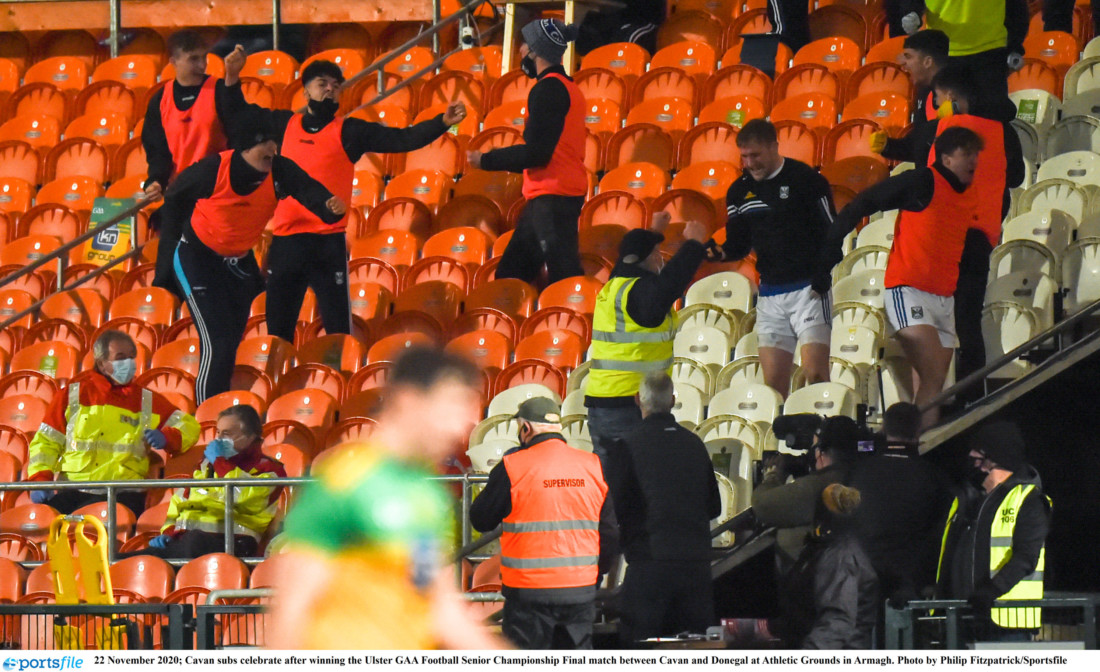By Alan Rodgers
ST Tiernach’s Park in Clones lay empty on Sunday afternoon as the Ulster final in this strangest of years was switched away from the venue for the first time in half a century.
But, while all has changed and changed utterly in 2020, there remained a comforting consolation in the fact that the battle for the Anglo Celt Cup was reaching its climax.
This was the first final in Armagh since 1941, a year when Cavan also won the title. True, there were no fans present this time, and the Athletic Grounds was eerily quiet when compared to the usual atmosphere which greets our province’s premier footballing occasion.
Nevertheless, the occasion still captured the imagination for those, like myself, fortunate enough to be there in person, or the many thousands more from Cavan and Donegal watching at home under the tier five restrictions.
For, Ulster final day is always special and it was so appropriate that this final first fulfilled and then surpassed all the expectations. It will, in time, be remembered as a classic, not least because of the famous result that saw Cavan bridge a 23-year gap.
Few outside the immediate Breffni bubble expected such a scenario in the build-up to the decider. After all, Donegal had swept Tyrone and Armagh aside, and were being tipped as potential challengers to the mighty Dubs.
There were no traffic queues heading into Armagh, no problem getting a parking space and no need to struggle past the advancing fans as they made their way to the ground on a sunny summer afternoon. For once, the journey went like clockwork!
It was all so different of course, from past occasions. Like Ulster final day in 1983 when more than 30,000 watched Seamus Bonner score from a penalty to oust Cavan. I watched that one from the O’Duffy Terrace, and I was in my same favoured location, too, when Frank McGuigan scored the 11 points in the Centenary Year of 1984.
There are special memories as well of Down’s style in 1991, the rain and terrible conditions of 1993, the blistering heat of 1995 and 1997 when Cavan were also in action, and the drama of 2016 when the late points saw Tyrone spring a surprise against Donegal to win a first title in what seemed an eternity but in reality was just six years.
Those were days to remember and 2020 will ultimately go into that same category of special Ulster finals.
It was good that Ulster GAA produced a commemorative programme. It was good that the occasion went ahead with much of the same sense of occasion, while adhering to the coronavirus restrictions.
Most of all, though, the result was what made it and that’s no offence to Donegal, who have been the dominant side in Ulster for a decade now and very worthy champions five times during that time.
This has been a season of shocks and long awaited title wins at club and inter-county level. We can’t forget Ederney’s long-awaited win in the Fermanagh Championship, Maghery’s Armagh success and that of Dungannon in Tyrone. The outpouring of emotion released by those successes was matched by the sheer joy which greeted the final whistle and Cavan’s 1-13 to 0-12 victory as darkness fell on the Cathedral City.
What a pity there weren’t spectators in attendance to join in the celebrations. Suffice to say, though, that the Cavan players and supporters will be basking in the glory of their triumph in equal measure whether they were in the Athletic Grounds or not. It is what it is, and nothing can dilute the sheer passion which enveloped the homes and hills in the Breffni county on Sunday night.
Yes indeed, an Ulster final that will go down in history as one to remember.
comment@gaeliclife.com
Receive quality journalism wherever you are, on any device. Keep up to date from the comfort of your own home with a digital subscription.
Any time | Any place | Anywhere












